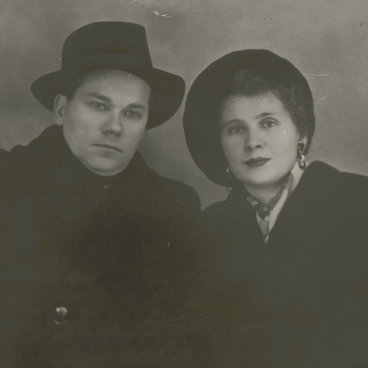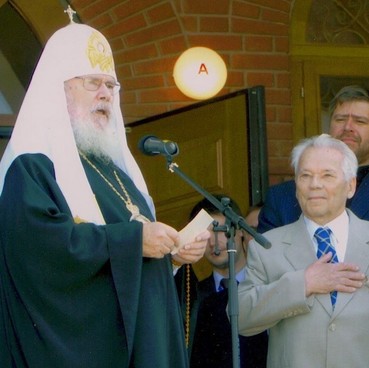In 2007, the Altai Krai solemnly celebrated its 70 years. Its administration organized various events, and one of their main visitors was Mikhail Kalashnikov, legendary native of Altai and creator of the most famous machine gun in the world. His childhood and youth years passed in the small village of Kurya in the Altai foothills. And in that village, the regional government organized the famous engineer’s meeting with his fellow countrymen: social activists, schoolchildren, relatives and those who knew Kalashnikov in different years of his life. The meeting took place in the Kurya School of arts.
Mikhail Kalashnikov’s parents, Kuban Cossacks Timofey and Alexandra, moved to Kurya before the October Revolution, during Stolypin’s reforms. What made them change their southern land for a severe Siberian province was the news about the fact that in Altai, plots of land were given to everyone who wanted them. The Kalashnikovs went to Altai in search of better life, taking their three children with them. In Kurya, their family grew fourfold.
The house where the future engineer’s parents, brothers and sisters lived has not survived till the present days, neither have the photos of his home. He recalled that his rammed earth house stood at the bank of the river on the outskirts of the village. Kalashnikov has very ‘extreme’ memories about the river, now almost dried up: he was drowning in it twice. For the first time it happened while he was swimming, and for the second time, when he tried to skate on the river ice. According to Mikhail Timofeyevich, there are two things that he has not learned till now and still regrets about that: swimming and skating.
Today, there are no inhabited houses left; they gave way to bucolic riverbank landscapes. But the school where Mikhail Kalashnikov studied has preserved its original appearance until today. Now, it is home to the engineer’s memorial museum. In its collections, one can find many of his personal belongings: his military uniform, civil clothes, his collection of several dozens of wrist watches, as well as letters and telegrams from people from all around the world. In one of the halls of the museum, the interior of Kalashnikov’s Izhevsk apartment was recreated. There, one can find everyday objects that surrounded Mikhail Kalashnikov during the last years of his life.
In 2007, in the days of celebration of the 70 years of the Altai Krai, Alexander Bogdanovich Karlin was just starting his career as a governor. Like Kalashnikov, Alexander Karlin was born in the Altai Krai, but in a village named Medvedka. The future governor graduated from the Sverdlovsk law institute with honors and spent many years working at important posts in the public prosecutor’s office and judicial administration. Since August 2005, Karlin was acting head of administration of the Altai Krai, and since December 2007, became the governor of the region. He held that position for over 10 years.
During Alexander Karlin’s rule, the socioeconomic life in the region changed for the better. The Altai Krai dropped out of the list of regions with depressed economy and recovered its past glory as a Siberia’s industrial, agricultural and touristic center. Various sociocultural programs for development and reconstruction of objects for the 75th and the 80th anniversaries of the region have been scheduled and are being realized now. Medicine, pharmaceutics, and education are developing successfully. Alexander Karlin received several awards for his social activity from Patriarch Kirill of Moscow and the whole Russia.
Mikhail Kalashnikov’s parents, Kuban Cossacks Timofey and Alexandra, moved to Kurya before the October Revolution, during Stolypin’s reforms. What made them change their southern land for a severe Siberian province was the news about the fact that in Altai, plots of land were given to everyone who wanted them. The Kalashnikovs went to Altai in search of better life, taking their three children with them. In Kurya, their family grew fourfold.
The house where the future engineer’s parents, brothers and sisters lived has not survived till the present days, neither have the photos of his home. He recalled that his rammed earth house stood at the bank of the river on the outskirts of the village. Kalashnikov has very ‘extreme’ memories about the river, now almost dried up: he was drowning in it twice. For the first time it happened while he was swimming, and for the second time, when he tried to skate on the river ice. According to Mikhail Timofeyevich, there are two things that he has not learned till now and still regrets about that: swimming and skating.
Today, there are no inhabited houses left; they gave way to bucolic riverbank landscapes. But the school where Mikhail Kalashnikov studied has preserved its original appearance until today. Now, it is home to the engineer’s memorial museum. In its collections, one can find many of his personal belongings: his military uniform, civil clothes, his collection of several dozens of wrist watches, as well as letters and telegrams from people from all around the world. In one of the halls of the museum, the interior of Kalashnikov’s Izhevsk apartment was recreated. There, one can find everyday objects that surrounded Mikhail Kalashnikov during the last years of his life.
In 2007, in the days of celebration of the 70 years of the Altai Krai, Alexander Bogdanovich Karlin was just starting his career as a governor. Like Kalashnikov, Alexander Karlin was born in the Altai Krai, but in a village named Medvedka. The future governor graduated from the Sverdlovsk law institute with honors and spent many years working at important posts in the public prosecutor’s office and judicial administration. Since August 2005, Karlin was acting head of administration of the Altai Krai, and since December 2007, became the governor of the region. He held that position for over 10 years.
During Alexander Karlin’s rule, the socioeconomic life in the region changed for the better. The Altai Krai dropped out of the list of regions with depressed economy and recovered its past glory as a Siberia’s industrial, agricultural and touristic center. Various sociocultural programs for development and reconstruction of objects for the 75th and the 80th anniversaries of the region have been scheduled and are being realized now. Medicine, pharmaceutics, and education are developing successfully. Alexander Karlin received several awards for his social activity from Patriarch Kirill of Moscow and the whole Russia.

